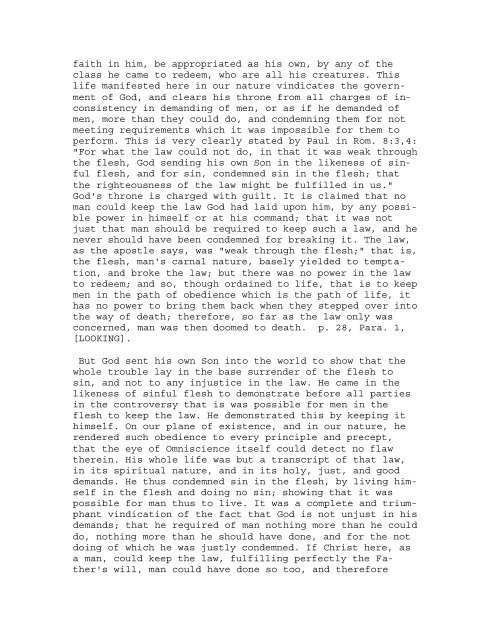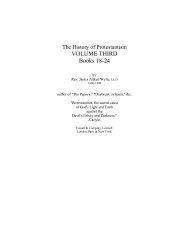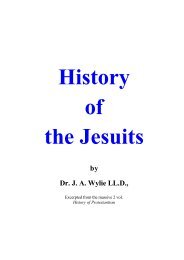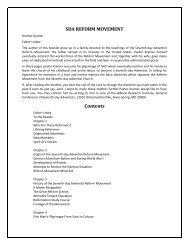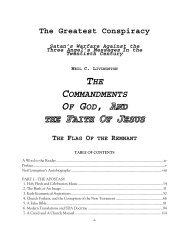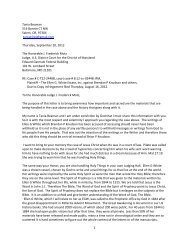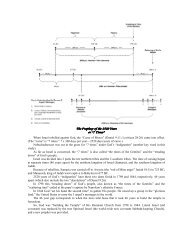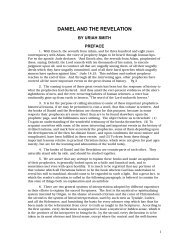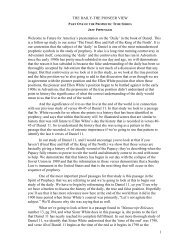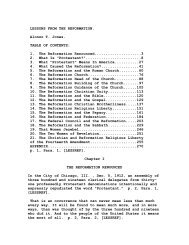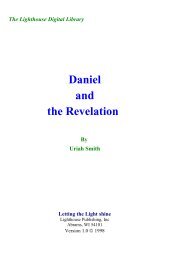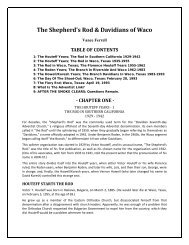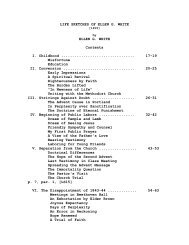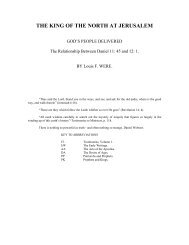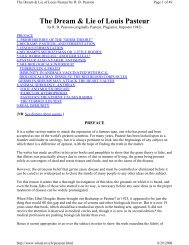LOOKING UNTO JESUS OR CHRIST IN TYPE AND ANTITYPE. BY ...
LOOKING UNTO JESUS OR CHRIST IN TYPE AND ANTITYPE. BY ...
LOOKING UNTO JESUS OR CHRIST IN TYPE AND ANTITYPE. BY ...
Create successful ePaper yourself
Turn your PDF publications into a flip-book with our unique Google optimized e-Paper software.
faith in him, be appropriated as his own, by any of the<br />
class he came to redeem, who are all his creatures. This<br />
life manifested here in our nature vindicates the government<br />
of God, and clears his throne from all charges of inconsistency<br />
in demanding of men, or as if he demanded of<br />
men, more than they could do, and condemning them for not<br />
meeting requirements which it was impossible for them to<br />
perform. This is very clearly stated by Paul in Rom. 8:3,4:<br />
"For what the law could not do, in that it was weak through<br />
the flesh, God sending his own Son in the likeness of sinful<br />
flesh, and for sin, condemned sin in the flesh; that<br />
the righteousness of the law might be fulfilled in us."<br />
God's throne is charged with guilt. It is claimed that no<br />
man could keep the law God had laid upon him, by any possible<br />
power in himself or at his command; that it was not<br />
just that man should be required to keep such a law, and he<br />
never should have been condemned for breaking it. The law,<br />
as the apostle says, was "weak through the flesh;" that is,<br />
the flesh, man's carnal nature, basely yielded to temptation,<br />
and broke the law; but there was no power in the law<br />
to redeem; and so, though ordained to life, that is to keep<br />
men in the path of obedience which is the path of life, it<br />
has no power to bring them back when they stepped over into<br />
the way of death; therefore, so far as the law only was<br />
concerned, man was then doomed to death. p. 28, Para. 1,<br />
[<strong>LOOK<strong>IN</strong>G</strong>].<br />
But God sent his own Son into the world to show that the<br />
whole trouble lay in the base surrender of the flesh to<br />
sin, and not to any injustice in the law. He came in the<br />
likeness of sinful flesh to demonstrate before all parties<br />
in the controversy that is was possible for men in the<br />
flesh to keep the law. He demonstrated this by keeping it<br />
himself. On our plane of existence, and in our nature, he<br />
rendered such obedience to every principle and precept,<br />
that the eye of Omniscience itself could detect no flaw<br />
therein. His whole life was but a transcript of that law,<br />
in its spiritual nature, and in its holy, just, and good<br />
demands. He thus condemned sin in the flesh, by living himself<br />
in the flesh and doing no sin; showing that it was<br />
possible for man thus to live. It was a complete and triumphant<br />
vindication of the fact that God is not unjust in his<br />
demands; that he required of man nothing more than he could<br />
do, nothing more than he should have done, and for the not<br />
doing of which he was justly condemned. If Christ here, as<br />
a man, could keep the law, fulfilling perfectly the Father's<br />
will, man could have done so too, and therefore


